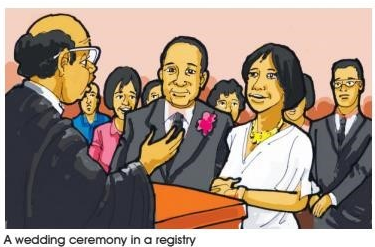Week 4
SUBJECT: SOCIAL STUDIES
TERM: 1ST TERM
CLASS: PRIMARY 5
Topic: marriage custom and practice
Behavioral objectives: At the end of the lessons, the pupils should be able to
- Identify steps in selecting marriage partners.
- identify and explain values relevant to the selection of partners.
- identify the role played by families and others in the selection of marriage partners.
- identify the consequences of some unhealthy marriage practices. 5 suggest ways of preventing unhealthy marriage practices.
Instructional materials
Different kind of Charts and references materials
Scheme of work
And other relevant materials
6 years basic Education curriculum
Online information
Building background connection to prior knowledge: pupils are familiar with the topic in their previous classes
CONTENT OF THE TOPIC
Steps in selecting marriage partners (Marriage procedure)
Marriage is the union of a man and woman as husband and wife. Marriage does not just happen. A number of steps lead to marriage. First, the man and the woman meet. This usually takes place:
- In social gatherings like parties.
- Where they live.
- At school.
- In religious gatherings.
- When their families come together in village or town ceremonies.
- In their places of work.
The marriage ceremony
The marriage ceremony is the last stage. The ceremony takes any suitable form. Generally, the preparation and the actual ceremony take this form: 1 A special place, usually a big hall, is arranged for a party.
- The lady gets a wedding dress and the man gets a suit. The couple’s parents, friends and relations also get their dresses ready.
- The first part of the ceremony is often a religious ceremony performed by religious leaders.
- Music is also arranged for the event.
- The couple makes their relationship officially recognized, by going to the marriage registry to get an official marriage certificate.

Values relevant to the selection of partners
It is important for people seeking marriage partners to look for basic qualities before selecting a partner. These qualities include:
- Trust: It is important to choose partners who are trustworthy and dependable, in order to have a good and long-lasting relationship.
- Love and affection: When selecting partners for marriage, it is important for both partners to love and show affection to each other. If one of the partners shows love and affection, while the other does not, the relationship may not last long. It would break up eventually.
- Tolerance: People should only select those that can tolerate or accommodate their behavior as partners. Otherwise, there will be quarrels and disagreements between them.
- Honesty: People seeking partners should select those that are honest, and not fraudsters, liars or backbiters.
Role played by families and others in the selection of marriage partners
- The families of both the suitor and the bride-to-be provide useful advice to both of them on how to go about the task of selecting a suitable husband or wife.
- The family of the bride-to-be tries to get some important information about the man, such as his character, his background, and his family. The family of the suitor also does the same.
- The lady’s family and other relations meet to make useful suggestions on how to plan the marriage ceremony, and suggest steps to be followed in order to organize a successful marriage ceremony.
- The family members of the suitor also meet to plan how to meet the family of the lady. They also make arrangements for the gifts and money to be taken to the family.
Some unhealthy marriage practices and their consequences
Some unhealthy marriage practices common in our society include the following: 1 Early marriage
- Same-sex marriage
- Trial marriages
- Forced marriages
- Widow (or wife) inheritances
Early marriage occurs when two persons who are not mature to marry get married at a very early age. Most times, this marriage does not last long, and couples get divorced or separated shortly after marriage, because of lack of understanding and maturity.
Same-sex marriage occurs when two people of the same sex, for example, a man and a man or a woman and a woman, live together as a couple. This is not accepted by most ethnic groups in Nigeria. But there are occasions when people of the same sex get married. Such people are not accepted in most societies, and people generally condemn this kind of marriage.
Trial marriage does not last long, because it is based on experiment to test whether such a marriage would work well or not. Most times, the partners are not compatible; so they often disagree.
Forced marriage is marriage that is not based on consent or agreements between both partners. Such a marriage often has trouble and disagreements between both partners. This kind of marriage does not last for a long time. Widow inheritance occurs when the brother or any mature male member of a dead man’s family inherits his wife. This practice is common amongst the Yoruba and Igbo ethnic groups in Nigeria. This marriage practice also comes with trouble and disagreements, because the woman is forced to marry someone she may not love.
Ways of preventing unhealthy marriage practices
- Early marriage should be discouraged.
- Same-sex marriage is immoral, unlawful in Nigeria and not ideal. Most religions preach against it. It should, therefore, be discouraged.
- Widow Inheritance is barbaric and ancient. It should, therefore, be stopped.
- Marriage should be based on love and agreement between the man and woman. People should not be forced into marriage. The practice of forcing people into marriage should be discouraged.
Assessment and evaluation
Teacher asks questions from pupils based on the topic
Wrap up and conclusions
Teacher goes over the topic for better understanding.
Assignment
1. Define marriage
